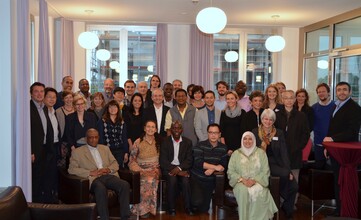International Conference ‘The Grammar of Justice'

The international conference The Grammar of Justice was the first of a series of conferences envisaged by the Leibniz Research Group Transnational Justice. It brought together a group of almost 30 scholars from 14 countries around the world, including Brasil, Peru, Mexico, Ghana, Nigeria, South Africa, Tanzania, Egypt, Tunisia, China, India, Canada, United Kingdom and Germany in order to discuss the grounds and contours of a universalizable notion of justice.
Participants
| Joseph Abgakoba | University of Nigeria |
| Martin Ajei | University of Ghana, Legon, Accra |
| Ciro Alegría | PUC del Perú, Lima |
| Luiz Bernardo Araújo | Universidade Estadual de Rio de Janeiro, Brasilien |
| Neera Chandhoke | University of Delhi, Indien |
| Jau-hwa Chen | Soochow University, Taiwan |
| Pochung Chow | The Chinese University of Hong Kong, China |
| Jiwei Ci | University of Hong Kong, China |
| Esack Farid | University of Johannesburg, Südafrika |
| Joao Feres | Universidade Estadual de Rio de Janeiro, Brasilien |
| Katrin Flickschuh | London School of Economics, England |
| María Pía Lara | Universidad Autónoma Metropolitana, Mexiko |
| Helen Lauer | University of Ghana |
| Juan Espíndola Mata | Universidad Nacional Autónoma de México |
| Bernard Matolino | University of Kwa zulu Natal, Pietermaritzburg, Südafrika |
| Pratap Bhanu | Center for Policy Research, Delhi, Indien |
| Soumaya Mestiri | Uni Tunis, Tunesien |
| Marcos Nobre | Unicamp, Campinas, Sao Paolo, Brasilien |
| Peter Osimiri | University of Lagos, Nigeria |
| Heba Raouf Ezzat | Uni Kairo, Ägypten |
| Haiming Wen | Renmin University of China |
| Melissa Williams | University of Toronto, Canada |
| Lea Ypi | London School of Economics, England |
| Zhao Tingyang | China Academy of Social Sciences, China |

The aim was not to a construct a common ethos through ‘intercultural dialogue’ among representatives of certain traditions or societies. Rather, we would like to draw on different philosophical views to explore in how far our understanding of justice is a concept that is used to deal with deep-seated social conflict so as to establish non-dominating social and political relations: Does the grammar of justice really point to the absence of domination or to something else? Is justice really the main concept used to regulate or even solve social conflicts and to establish a legitimate social order? Or are there other concepts that we might have to draw on?
More events financed by Leibniz funds
Guest lectures in the Colloquium Political Theory
|
13.11.2012 |
Albena Azmanova (Kent Univ. Brüssel): „Political Judgment for an Agonistic Democracy” |
|
27.11.2012 |
Cristina Lafont (Northwestern/Wiko Berlin): „Global Governance and Human Rights” |
|
04.12.2012 |
Lea Ypi (LSE): „Activist Political Theory and Avant-Garde Agency”, Kommentar von Jörg Schaub (Essex) |
|
16.04.2013 |
Nikolas Kompridis (Sydney): “Recognition and Receptivity: Forms of Normative Response in the Lives of the Animals We Are” |
|
14.05.2013 |
Jürgen Habermas: “Nachmetaphysisches Denken II” |
|
21.05.2013 |
Duncan Ivison: „Liberty as a Political Value“ |
|
30.04.2013 |
Michel Rosenfeld: “Recasting secularism as one conception of the good among many in a post-secular constitutional Polity” |
|
08.12.2014 |
John McCormick: “The Legitimacy Crisis of the Weimar Republic: Rational and Theocratic Authority in the Schmitt-Strauss Exchange” |
|
23.06.2015 |
Allen Buchanan: “Toward a Naturalistic Theory of Moral Progress“ |
|
10.05.2016 |
Alan Patten (Princeton University): “How to Justify Religious Accommodation: A Liberal Egalitarian Approach” |
|
23.05.2017 |
David Held (Durham): “Elements of a Theory of Global Politics From the Holocaust to the Present Day” |
|
11.07.2017 |
Claus Offe (Berlin): “Referendum vs. Institutionalized Deliberation. What Democratic Theorists Can Learn from the 2016 Brexit Decision” |
Conferences, workshops and guest lectures
|
15.11.2013 |
“The Justification of Norms Beyond the State: Institutions, Procedures, Agents”, conference in New York Participants: Lea Ypi (commentator), Stefan Gosepath (commentator), Seyla Benhabib, Philip Pettit, Rainer Forst (commentator), Turkuler Isiksel (commentator), Mattias Kumm, Jean Cohen (commentator), Klaus Günther (commentator) |
|
10. - 12.09.2014 |
“The Grammar of Justice”, conference at Goethe-University Frankfurt Participants: Helen Lauer, Ciro Alegria, Jiwei Ci, Liuz Bernardo Leite Araujo, Tingyang Zhao, Soumaya Mestiri, Joao Feres Junior, Martin Odei Ajei, Joseph C.A. Agbakoba (University of Nigeria), Bernard Matolino, Juan Espindola Mata, Katrin Flikschuh, Neera Chandhoke, Po Chung Chow, Peter Sunday Osimiri, Haiming Wen, Lwaitama Azaveli Feza, Heba Raouf Ezzat, Mogobe Bernard Ramose, Jau Hwa Chen, Marcos Severino Nobre, Lea Ypi, Maria Pia Lara, Melissa Williams |
|
17.06.2015 |
Chiara Lepora: “Disaster Ethics. Field Perspectives on the Ethical Challenges of Disaster Response”, lecture, Goethe-University Frankfurt |
|
25.06.2015 |
Workshop on Andrea Sangiovanni “Humanity, Reciprocity, and Solidarity: Three Essays on International Justice” Participants: Miriam Ronzoni, Tamara Jugov, Stefan Gosepath, David Miller, Laura Valentini, John Tasioulas, Albena Azmanova, Andrea Sangiovanni, Thomas Christiano |
|
26.11.2015 |
Jasser Auda: „An Islamic Critique of Authoritarian Rule“, lecture at Goethe-University Frankfurt |
|
08.12.2015 |
Bernhard Schlink: „Praktische Gerechtigkeit“, public lecture at Goethe-University Frankfurt |
|
11.12.2015 |
„Verantwortung für historisches Unrecht“, book workshop at Goethe-University Frankfurt, Participants: Jenny Tillmanns, Philipp Schink, Franziska Dübgen, Dorothea Gädeke, Johannes Schulz, Eva Buddeberg, Michael Schefczyk (Karlsruhe) |
| 14.-15.7.2016 |
"Europe Today: Normative Challenges", conference in collaboration with Justitia Amplificata Participants: Cristian Dimitriu, Luara Ferraccioli, Axel Gosseries, Tamar Meisels, Alasia Nuti, James Pattison, Isaac Taylor, Gabriel Wollner, Lea Yp |
| 22.9.2016 |
"Kantian Approaches in Political Philosophy", workshop with Arthur Ripstein, in collaboration with Justitia Ampflificata Participants: Arthur Ripstein, Lea Ypi, Tamara Jugov, Stefan Gosepath, Rainer Forst |






